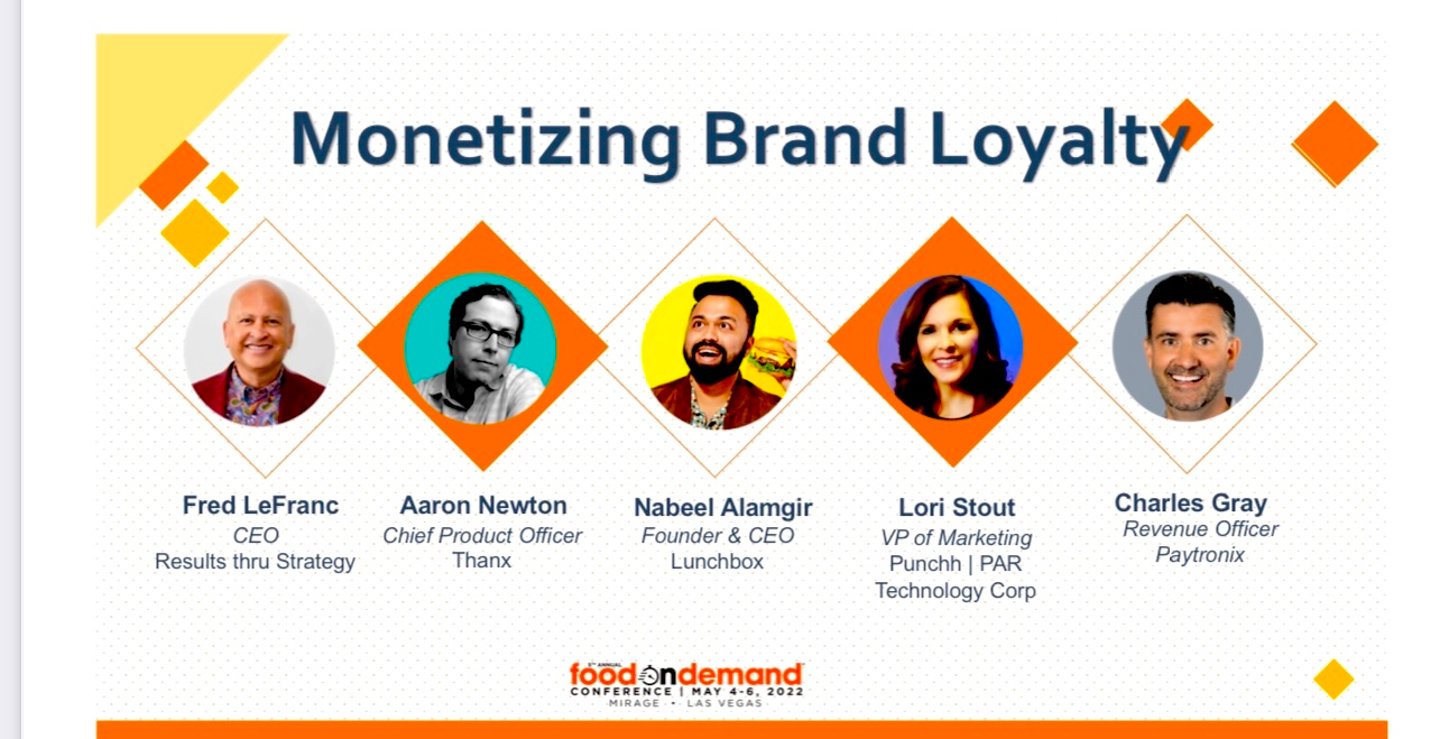Winning Customer Loyalty: Same Mountain, Different Paths
The session entitled “Monetizing Brand Loyalty” at the Food On Demand Conference, held in Las Vegas May 4-6, may have just as easily been called "Same Mountain, Different Path". That’s how moderator Fred LeFranc, Founding Partner & CEO of Results Thru Strategy, referred to the discussion on stage by a few of the industry’s most innovative and powerful loyalty players. Panelists included Aaron Newton, Chief Product Officer, Thanx; Nabeel Alamgir, Founder & CEO of Lunchbox; Lori Stout, VP of Marketing for Punchh at PAR Technology, and Charles Gray, Chief Revenue Officer at Paytronix.
At times bold, occasionally funny, and insightful throughout, this panel gave us a fresh and authentic taste of how each brand approaches loyalty, and how they work with restaurants to personalize guest experiences and cultivate brand affinity. Here are a few key takeaways from each panelist:
Paytronix’s Gray believes AI-powered solutions can help individualize experiences, without being creepy. The company gathers data from 450 integrations and 38K locations in the US (and a few thousand in Europe) and pinpoints trends, while working consultatively with restaurants to find the best approach for their customers. “We know your customer better than you do because we see them across multiple brands.” Gray's team connects the dots along the way to give restaurants a holistic picture. He also stressed the importance of getting the data first-hand. “We have to figure out how to work together. It’s (third-party delivery) not going away. It’s a part of our ecosystem, so we have to find balance.”
Thanx’s Newton agrees, and offers that restaurants need to create something customers can’t get on the third-party platforms. “Your primary competitor isn’t the restaurant down the street. It’s the third-party delivery companies,” he said. He gave the example of a customer wanting something from a brand. But something else happens when they turn to the marketplace platforms to order it. Suddenly, they’re enticed by all these other choices, resulting in eroded brand loyalty. "The lack of investment in owning the customer costs you way more than 30 percent,” he said. “We believe the benefits of ordering direct need to be as good as the food.” He pointed to hidden menu items, guests gaining access to their favorite recipes, and other VIP experiences, like tastings, make guests feel special. Newton also said Thanx helps restaurants become more digitally mature, so they can survive when the world shifts underneath them.
Punchh’s Stout confirms the platform will remain open (with 200+ integrations), post-PAR acquisition. She agrees with collecting “breadcrumbs of data”, while making it easy for customers to shop. “I want to be creeped out by the brands I love,” she said. By integrating at the sku level at the POS, and feeding back information in real time, knowing guests can replace the need for discounts. She is looking to create an emotional experience, where customers really feel like a brand knows them. Referring back to the PAR acquisition, she emphasized, “Integrations will always be important. We will always be an open platform. We’re reinventing ourselves and asking what is the best environment for the brands we serve?”
Lunchbox’s bold leader Alamgir held nothing back. “We’re trying to convert third-party to first-party sales. These companies (the third-party delivery companies), nobody really likes them. Let’s let restaurant people build restaurant tech. Enough of this giving them 30 percent.” He sees himself as an activist, pushing the boundaries of “what restaurant technology deserves”. His viewpoints are unique and compelling, even if you disagree. “We’re trying to understand what the data is saying and help restaurants tell stories. Not all brands have stories to tell, or food that deserves loyalty.” Admitting they cannot go it alone, Lunchbox is looking to recruit companies to join them, to “fight the power”. He announced the release of Lunchbox Rails, whereby the company is gathering order information from digital channels, including the restaurant's website and third-party marketplaces, and injecting them directly into the POS. In true Alamgir form, he claimed the name “Rails” suddenly came to him out of nowhere, met with a collective laugh from the audience.


